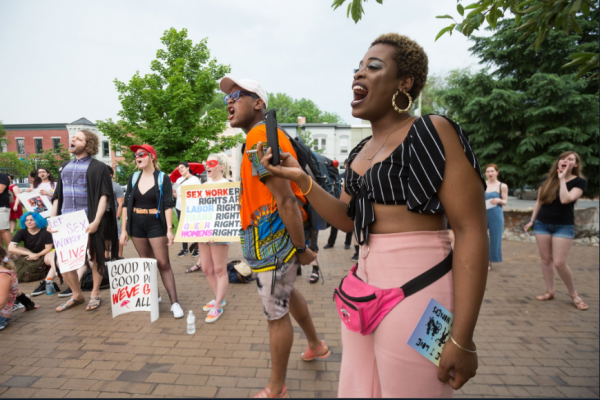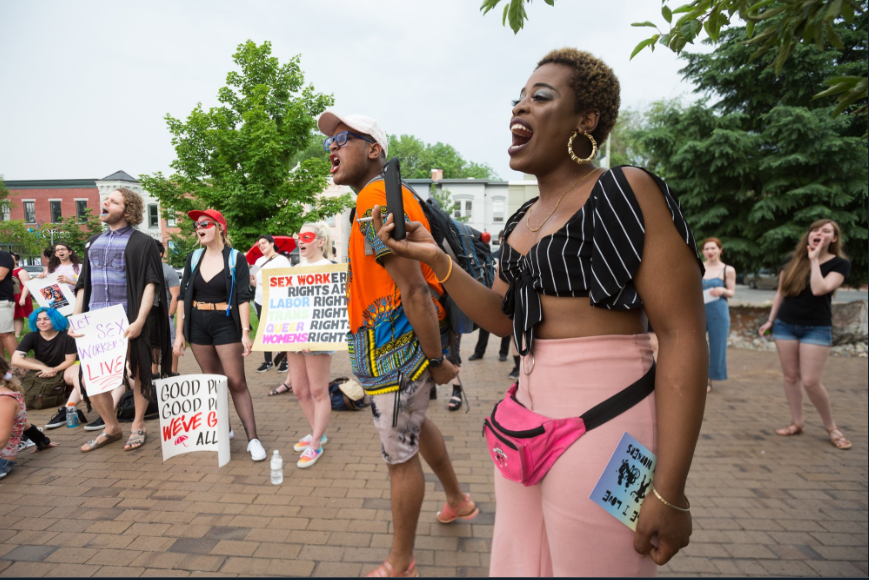
What a week it’s been for sex worker organizing! The first sex worker Lobby Day on June 1st was followed by nationwide sex worker action on International Whores’ Day on June 2nd. Post-SESTA, this annual day of organizing picked up more momentum than ever. Here’s our attempt at curating the coverage of this week’s news for you:
The crown has honored New Zealand Prostitutes’ Collective founder Catherine Healy with the title of Dame. Whether you’re excited about this or think it’s more of the colonialist same, it’s certainly news to note.
Community organizer and cam and porn worker Anna Moone wrote for Vice’s Motherboard on sex worker Lobby Day in D.C. this Saturday. Organized by SWOP and Survivors Against SESTA, 40 sex workers found a surprisingly welcome reception in Capitol Hill from both staffers for reps who voted for SESTA and for those who voted against it:
I expected these meetings to be an uphill battle of fighting for our humanity, but we all left the meeting feeling surprisingly hopefully about our prospects for the day.
Even more surprisingly, the other two representatives whose staffers we met—Mark Takano (D-CA) and Don Beyer (D-VA)—both voted against SESTA. Instead of having to explain why SESTA is a harmful bill, we were able to spend our meetings strategizing on how to work together better moving forward. In addition to feeling that the law would hurt sex workers, both Takano and Beyer felt that this bill would make it harder to stop sex traffickers, and they both also had concerns that SESTA might expand mandatory minimum sentencing laws. They also gave us advice on what other staffers and representatives would make good allies for us to reach out to and build relationships with. Finally, they told us how important it was that we came to speak with them, because sex workers contacting our representatives about how bills will harm us gives them the information they need to use to justify opposing bills. ”
In Washington, Buzzfeed followed a sex worker named Jackie while she lobbied Congress.
“I need to earn a living, but I also have to be safe. So I have to make a really hard choice about what to do, whether I’m going to invite this person into my home. … I’m crippled by fear and anxiety. I was homeless when I was younger, and I just never want to go back there,” Jackie said.
Gizmodo’s staff talked to organizers in Manhattan, including Red from Support Ho(s)e and MF Akynos from the Black Sex Workers Collective.
Red says that sex workers’ anger highlighted and validated in the media “allows us to be fully formed human beings in the news.”
“And we deserve that,” Red continues, “because we are fully formed human beings that are just working and surviving and supporting ourselves and our families and our friends as best we can.”
The Daily Beast also covered the New York event, noting the diverse set of speakers that addressed the crowd, including trans sex worker leader Ceyenne Doroshow:
Ceyenne Doroshow, the Founder and Director of the advocacy organization GLITS (Gays and Lesbians Living In a Transgender Society) shared, “I’ve buried so many children. I’ve seen so many girls get murdered…losing my sisters, losing my brothers. This is sick.”
Melissa Gira Grant wrote about the NYC rally at The Appeal, noting that a vital sex worker organizer was incarcerated that day:
As the rally occupied the space surrounding Washington Square Park’s arch, protestors learned that across the river in Brooklyn, one New York woman working to change anti-sex work laws sat in jail. Tiffaney Grissom said that the previous night she was in the Brooklyn neighborhood of Bushwick, and at about 4 a.m. she was arrested and charged with “loitering for the purposes of prostitution.” Grissom, who is Black and trans, is also a plaintiff on a class action suit challenging this law, charging it is unconstitutional and that the New York Police Department enforce it disproportionately against Black and Latinx women.
Sixteen hours later, Grissom was still waiting for her court appearance. When I met her in 2016, she told me she had engaged in sex work sometimes, but most of the time that she was charged with loitering she was just hanging out. “It’s a way to arrest a lot of people for nothing,” said Cynthia H. Conti-Cook, a staff attorney at The Legal Aid Society, who is involved in bringing the class action suit against the loitering law and who Grissom called after her Saturday arrest. “It seemed like an easy arrest,” Grissom told The Appeal just outside the Brooklyn court where she was released just before 9 p.m. on Saturday. “I don’t need to have to prove myself as to why I’m outside, or defend myself for being outside.”
UPDATE: Emily Witt at the New Yorker published an in-depth longread on NYC IWD events and their leadup, starting from The Black Sex Workers Collective’s fundraiser a few days before, moving to Lobby Day, and then to the day itself. Akynos, Mariah Lopez from STARR (Strategic Trans Alliance for Radical Reform), Red Schulte, Ceyenne Doroshow, Yin Q, Lorelei Lee, and other speakers and organizers are quoted at length. There’s a bit too much scandalized attention on what people were wearing, but Witt does goes into more detail on Tiffaney Grissom’s arrest and release, including the fact that another woman was also released from incarceration for a solicitation arrest that evening:
The arraignment took less than five minutes; Kings County refers low-level misdemeanor cases to a special court. The judge offered the defendants two possible dates, June 20th and June 27th—“Before Pride or after Pride,”[Mariah] Lopez said under her breath. (The New York City Gay Pride March and its attendant celebrations are June 24th.) Both defendants chose June 27th.
Their court dates set, and released from their handcuffs, Lopez led the two women out into the lobby. Lopez hugged Tatiana Hall, who was tearing up. “I was so scared,” she said. It was her first time getting arrested. We went outside and they told their stories. They had both been in Bushwick—“very up-and-coming and trendy,” Grissom said. The police arrested Grissom first, around 4 a.m., Hall later. Both said they were simply outside on the street. Hall had been talking to a man—a gay man, she added. Grissom said she was alone. “I’m not waving, I’m not being extra, I’m not throwing myself into cars, I’m not doing anything abstract, I’m just walking by looking pretty,” she said. “So it’s easy to recognize me, but when you see somebody and they’re not giving you a reason to arrest them, you have to try and figure out ways to get them.” Police officers are allowed to use their own discretion to determine a person’s intention to prostitute, criteria that might include the clothes a person is wearing. As Shekera had lamented, “You never had any rights. The Internet just made you have that false hope and you got comfortable and now the rug has been pulled out from underneath you.”
New York’s IWD events also got coverage in refinery29 and The Outline, and of course, many of us were overjoyed that we even made it to the headlines on Democracy Now.
In San Francisco, sex workers took the opportunity to protest Amy Schumer (you know, the SESTA-supporting “feminist” with the dead stripper jokes) and her appearance at Comedy Central’s Clusterfest that weekend.
Broadly published the firsthand accounts (and included gorgeous pictures!) of sex workers at the IWD event in Las Vegas. From Amber Batts:
“…Once I was arrested, that shit went away. Now I work minimum wage and I have to take food stamps. I don’t know what the hell this country is thinking, taking away our rights as sex workers. I feel very emotional about it still. Fear puts us in the background and that’s not going to happen anymore. With FOSTA and SESTA, we are standing in the forefront and calling out for our rights.
There were a wide variety of speakers at the rally in Oakland.
At the beginning of the rally at Frank H. Ogawa Plaza, a handful of speakers—including an Oakland mayoral candidate and a representative from the Electronic Frontier Foundation, a digital rights non-profit that opposed FOSTA—climbed onto the back of a parked pickup truck outfitted with speakers and railed against the law. Later, the crowd marched through the streets chanting “FOSTA won’t fix shit” and holding signs reading “END SESTA” and “#FUCK FOSTA,” all while local store owners poked their heads out of doorways to gawk.
Writer and sex worker organizer AK offers some personal reflections, including a sharp criticism of the usefulness of some organizers’ strategies.
The leadership of the sex worker rights movement, largely cisgendered white women with privileged experiences of sex work from a bygone era, continue to mobilize toward the repeal of FOSTA-SESTA even in the absence of political will. This legislation is an unholy alliance of Right and Left under the ominous umbrella of White Feminist ideology. In the House of Representatives it was passed with an overwhelming majority of 388 to 25. In the Senate scant opposition to the bill made strange bedfellows of Oregon Democrat Ron Wyden and former Republican presidential candidate Rand Paul. While sex worker rights activists direct vital community resources to a futile fight, culminating in a National Day of Action today commemorating the kitschy holiday International Whore’s Day, the death toll among poor sex workers continues to mount.
And finally, in this hybrid personal essay and voxsplainer, former Tits and Sass co-editor Susan Elizabeth Shepard connected the legal dots between escorting, stripping and other gig workers while illustrating why strippers are finally and rightfully organizing for better working conditions.
Gig economy workers can take one (negative) lesson from strippers: Decades of litigation over the status of workers in an industry will have a negligible impact as long as independent contractors remain a cheaper, unprotected class of labor. Businesses will see occasionally paying fines or settlements for violating labor laws as a reasonable cost relative to the savings of keeping their workers classified as contractors.
Instead of pursuing the enforcement of employee status, often undesirable for sex workers for a host of reasons, workers would benefit if independent contractors were granted a greater number of enforceable rights. Extending legal protections against discrimination would be the least that could be done for the marginally employed. Shifting some of the self-employment tax burden back from workers to businesses is the next step.

Regarding the rally and march in Oakland, the name of the plaza is not Frank Ogawa. It is Oscar Grant Plaza to honor the 2009 uprising of black and brown people across the town after BART police murdered Oscar Grant on NYE.